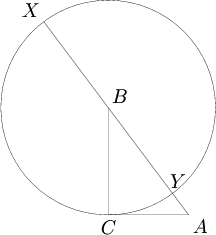Pythagoras Theorem
Contents
[hide]What is the Pythagorean Theorem?
What is the Pythagorean Theorem?
The Pythagoras Theorem is also referred to as the Pythagorean Theorem![]() Pythagorean Theorem is used to find a side of any right triangle. It is
Pythagorean Theorem is used to find a side of any right triangle. It is ![]() , where
, where ![]() and
and ![]() are the legs of the triangle, and
are the legs of the triangle, and ![]() is the hypotenuse.
is the hypotenuse.
Why is it useful?
To find sides and angles of right triangles. Also, Trigonometry is pointless without it. If you know three angles of a triangle you can use the Pythagorean Theorem to find the sides or the area even if the angles are not right. It is probably the most famous Theorem in all of math!
Can we prove it?
Yes! The are hundreds of proves. I will just show you a few of them. Mathematicians even make a hobby of finding these proves. Even a US president made a published proof! Of, course this was a president in the 1800s because, well, presidents now are not really up to proving something like that. (You know, Trump and the others).
Proofs
Proof 1
We use ![]() to denote the area of triangle
to denote the area of triangle ![]() .
.
Let ![]() be the perpendicular to side
be the perpendicular to side ![]() from
from ![]() .
.
![[asy] pair A, B, C, H; A = (0, 0); B = (4, 3); C = (4, 0); H = foot(C, A, B); draw(A--B--C--cycle); draw(C--H); draw(rightanglemark(A, C, B)); draw(rightanglemark(C, H, B)); label("$A$", A, SSW); label("$B$", B, ENE); label("$C$", C, SE); label("$H$", H, NNW); [/asy]](http://latex.artofproblemsolving.com/a/1/9/a19bed9f5ac971139756a395da4e29366d45fc52.png)
Since ![]() are similar right triangles, and the areas of similar triangles are proportional to the squares of corresponding side lengths,
are similar right triangles, and the areas of similar triangles are proportional to the squares of corresponding side lengths,
![]() .
.
But since triangle ![]() is composed of triangles
is composed of triangles ![]() and
and ![]() ,
, ![]() , so
, so ![]() . ∎
. ∎
Proof 2
Consider a circle ![]() with center
with center ![]() and radius
and radius ![]() . Since
. Since ![]() and
and ![]() are perpendicular,
are perpendicular, ![]() is tangent to
is tangent to ![]() . Let the line
. Let the line ![]() meet
meet ![]() at
at ![]() and
and ![]() , as shown in the diagram:
, as shown in the diagram:

Evidently, ![]() and
and ![]() . By considering the power of point
. By considering the power of point ![]() with respect to
with respect to ![]() , we see
, we see
![]() . ∎
. ∎
Proof 3
![]() and
and ![]() are squares.
are squares.
![[asy] pair A, B,C,D; A = (-10,10); B = (10,10); C = (10,-10); D = (-10,-10); pair E,F,G,H; E = (7,10); F = (10, -7); G = (-7, -10); H = (-10, 7); draw(A--B--C--D--cycle); label("$A$", A, NNW); label("$B$", B, ENE); label("$C$", C, ESE); label("$D$", D, SSW); draw(E--F--G--H--cycle); label("$E$", E, N); label("$F$", F,SE); label("$G$", G, S); label("$H$", H, W); label("a", A--B,N); label("a", B--F,SE); label("a", C--G,S); label("a", H--D,W); label("b", E--B,N); label("b", F--C,SE); label("b", G--D,S); label("b", A--H,W); label("c", E--H,NW); label("c", E--F); label("c", F--G,SE); label("c", G--H,SW); [/asy]](http://latex.artofproblemsolving.com/2/e/7/2e79de6673cd591bf38bff3efa048140bda61e9f.png)
![]() . ∎
. ∎
Pythagorean Triples
Pythagorean Triples are a group of integers a,b and c in which ![]() . These are the first few:
(3,4,5) (5,12,13) (7,24,25) (8,15,17)
. These are the first few:
(3,4,5) (5,12,13) (7,24,25) (8,15,17)
(9,40,41) (11,60,61) (12,35,37) (13,84,85)
(15,112,113) (16,63,65) (17,144,145) (19,180,181)
(20,21,29) (20,99,101) (21,220,221) (23,264,265)
(24,143,145) (25,312,313) (27,364,365) (28,45,53)
(28,195,197) (29,420,421) (31,480,481) (32,255,257)
(33,56,65) (33,544,545) (35,612,613) (36,77,85)
(36,323,325) (37,684,685)
And on and on...
Remember that if ![]() then
then ![]() so I did not include 6,8,10 or 10,24,26.
so I did not include 6,8,10 or 10,24,26.
Special Right triangles
45-90-45
Theorem
Say you have a right triangle with angles 45, 45 and 90. Then if ![]() (leg) is
(leg) is ![]() , then
, then ![]() (long side) is
(long side) is ![]()
Proof
If this triangle has two equal angles then it has two equal sides. Therefore we can make an equation: ![]() .
. ![]() means side and is the hypotenuse.
means side and is the hypotenuse. ![]() . We proved it!
. We proved it!
30-60-90
Theorem
If the angles of a right triangle are 30, 60 and 90, and if the short side is ![]() then the long side is
then the long side is ![]() and the other leg is
and the other leg is ![]() .
.
Proof
The long side is clearly ![]() because of the angles that are twice the size, so we can make an equation:
because of the angles that are twice the size, so we can make an equation: ![]() . t is the other leg.
. t is the other leg.
![]() We proved it!
We proved it!
Problem 1
Hawick is 15 miles south of Abbotsford, and Kelso is 17 miles east of Abbotsford. What is the distance from Hawick to Kelso?
Solution
![]()
Problem 2
A zip line starts on a platform that is 40 feet above the ground. The anchor for the zip line is 198 horizontal feet from the base of the platform. How long is the zip line?
Solution
![]()









